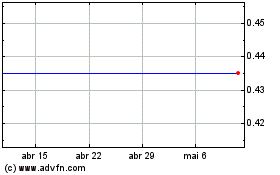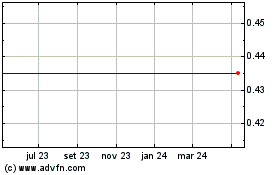BASF, MedAccess and the Bill & Melinda Gates Foundation collaborate to bring innovative mosquito nets to malaria-endemic coun...
08 Outubro 2019 - 9:20AM

To mark the Sixth Replenishment Conference of The Global Fund to
Fight AIDS, Tuberculosis and Malaria, BASF, MedAccess and the Bill
& Melinda Gates Foundation have announced an agreement that
will facilitate the supply of 35 million Interceptor® G2 mosquito
nets to combat malaria. The four-year agreement accelerates access
to this innovative new mosquito-control technology in countries
where progress is stalling due to insecticide
resistance. The agreement
enables BASF to better plan long-term resources and reduce the cost
of the new nets by an average of 40% over the contract period. This
will make the nets more accessible and affordable for countries
where insecticide resistance is growing, and conventional nets are
becoming less effective. The new nets will help to protect the
health of millions of people particularly in countries across
sub-Saharan Africa, including Burkina Faso, Côte d’Ivoire and Mali.
Trevor Mundel, President of Global Health at the Bill & Melinda
Gates Foundation said: “Mosquito control, particularly through bed
nets, has been the cornerstone of our progress against malaria over
the past 15 years. But insecticide resistance is threatening
progress in some of the highest-burden countries. This agreement
will help us stay ahead of resistance and bring new tools that are
much needed to the fight against a disease that can be effectively
prevented.”
Every year, malaria kills around 435,000 people
and there are an estimated 219 million cases. Nowhere is the
problem more severe than in Africa with more than 90% of deaths.
Beyond loss of life, malaria disrupts education, industries and
national economies. It is a major cause of global poverty. Saori
Dubourg, member of the BASF board of directors said: “For half the
world’s population, every day is a fight against malaria. Malaria
is preventable and treatable, yet it still causes the death of a
child under five years old every two minutes. This agreement will
ensure that this innovative new net technology gets to those
regions where it is most needed and saves lives.” In recent years,
the fight against malaria has made significant progress.
Insecticide-treated mosquito nets have been responsible for 69% of
the 663 million clinical cases of malaria averted between 2000 and
2015. However, after many years of declining incidence rates, the
highly adaptable mosquito has developed resistance to the
insecticides commonly used in malaria prevention, causing the
number of cases to rise again. More than 60 countries now report
resistance to at least one insecticide class used to combat
malaria. Health experts are calling for new tools and
collaborations to regain momentum. BASF’s new Interceptor G2
mosquito net is based on two insecticides and has been designed
specifically to combat resistance in the fight against
malaria. For more than a decade, BASF scientists worked to
successfully repurpose alpha-cypermethrin and chlorfenapyr, a
completely new insecticide class for public health, for use
together on mosquito nets. The dual-insecticide net received an
interim recommendation from the World Health Organization in 2017 –
the first for a product based on a new class of chemistry in more
than 30 years. Michael Anderson, CEO of social financing company,
MedAccess, said: “We are immensely motivated by the results of this
collaboration. If we are to stand a chance of beating malaria,
exciting new technology like the Interceptor G2 mosquito nets must
be made widely available. By introducing a new financial model, we
have been able to support a reduction in the price of the nets,
speed up their distribution and ensure there is a reliable supply.
Now, we will replicate efforts in other areas to ensure financial
and practical barriers to accessing medicines are broken down, for
good.”
Dr Yacouba Savadogo is national coordinator for
the Programme National de Lutte contre le Paludisme in Burkina
Faso, where the first nets will be distributed in 2019. He is also
optimistic that malaria can be beaten if organizations work
together. “It will depend on strategy, finance and implementation,
but with combined and continuous efforts, we can do it,” he
commented. “We have to combine many approaches and put our forces
together to fight malaria across whole regions, because mosquitoes
do not respect borders.”
Today’s announcement is a key achievement for
public private partnership and reflects the commitment of
organizations such as the Innovative Vector Control Consortium
(IVCC) who partnered with BASF to support the development of the
Interceptor G2 nets. It also supports the objectives of the New
Nets Project, co-financed by the Global Fund to Fight AIDS,
Tuberculosis and Malaria and Unitaid, and led by IVCC. The New Nets
Project will pilot and evaluate the impact of mosquito nets with
new insecticide combinations in countries hardest hit by malaria.
Overall, the agreement builds on the collaboration and efforts of
the Global Fund, Unitaid and the Clinton Health Access Initiative,
who are helping to bring life-saving products to communities
afflicted with malaria.
About BASF’s Agricultural Solutions
divisionWith a rapidly growing population, the world is
increasingly dependent on our ability to develop and maintain
sustainable agriculture and healthy environments. Working with
farmers, agricultural professionals, pest management experts and
others, it is our role to help make this possible. That’s why we
invest in a strong R&D pipeline and broad portfolio, including
seeds and traits, chemical and biological crop protection, soil
management, plant health, pest control and digital farming. With
expert teams in the lab, field, office and in production, we
connect innovative thinking and down-to-earth action to create real
world ideas that work – for farmers, society and the planet. In
2018, our division generated sales of €6.2 billion. For more
information, please visit www.basfpublichealth.com or
www.agriculture.basf.com or any of our social media channels.
About
MedAccess
MedAccess is a UK-based social finance company with the pioneering
mission to make global healthcare markets work for everyone. Our
core purpose is to make medical supplies more widely available at
lower prices in under-served markets. By applying the rigour and
skills of business finance, we’re providing a novel solution to the
challenge. We offer volume guarantees that reduce commercial risk
and allow medical manufacturers to accelerate supplies into new
markets at affordable and sustainable prices. In this way,
vaccines, medicines, diagnostic tests and medical devices can reach
patients far sooner than existing market forces would allow. For
more information see www.medaccess.org and follow MedAccess on
Twitter @MedAccessUK.
About the Bill & Melinda Gates
FoundationGuided by the belief that every life has equal
value, the Bill & Melinda Gates Foundation works to help all
people lead healthy, productive lives. In developing countries, it
focuses on improving people’s health and giving them the chance to
lift themselves out of hunger and extreme poverty. In the United
States, it seeks to ensure that all people—especially those with
the fewest resources—have access to the opportunities they need to
succeed in school and life. Based in Seattle, Washington, the
foundation is led by CEO Sue Desmond-Hellmann and Co-chair William
H. Gates Sr., under the direction of Bill and Melinda Gates and
Warren Buffett.
Media Contacts
BASF Stephanie
Reiss
stephanie.reiss@basf.com+49 621 6029843
MedAccessMarisol
Grandonmarisol@unfoldstories.co.uk+44 (0)7887 928116
Bill & Melinda Gates
FoundationJeff Chertackjeff.chertack@gatesfoundation.org+1
206 321 5793
Basic Energy Services (NYSE:BAS)
Gráfico Histórico do Ativo
De Dez 2024 até Jan 2025

Basic Energy Services (NYSE:BAS)
Gráfico Histórico do Ativo
De Jan 2024 até Jan 2025
